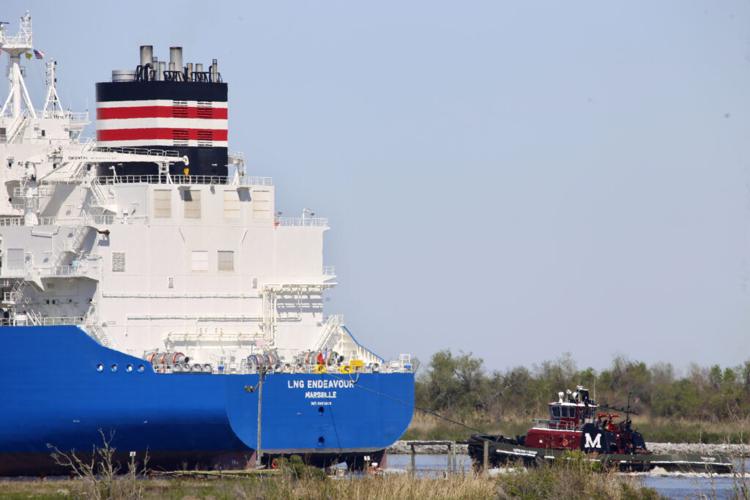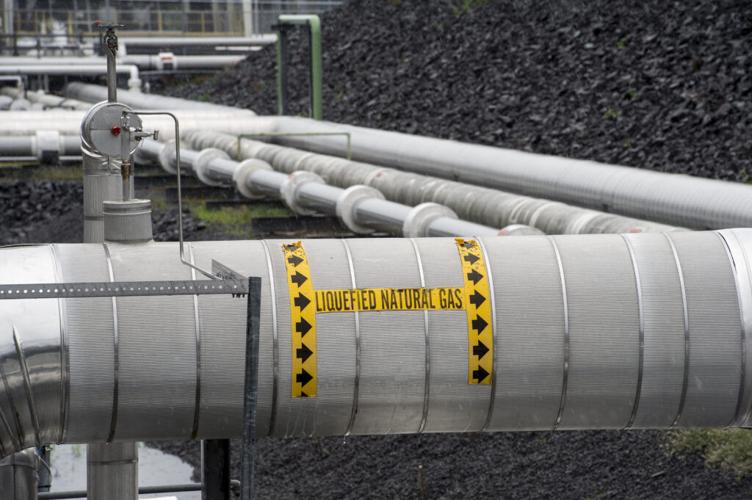Natural gas export rule changes may increase domestic gas prices in Colorado

A tugboat helps guide a French ship, known as the LNG Endeavor, through Calcasieu Lake near Hackberry, La., on Thursday, March 31, 2022. The ship was on its way to the Cameron LNG export facility to pick up liquified natural gas. Companies and investors have poured $63 billion into building U.S. LNG export terminals over the past decade and could spend more than $100 billion over the next 20 years, according to an analysis by Rystad Energy. (AP Photo/Martha Irvine)
Martha Irvine/Associated Press
According to a December 2024 Department of Energy report, Coloradans could pay as much as 31% more for their natural gas by 2050 if the federal government allows liquified natural gas exports from the U.S. to places like Asia and Europe to increase.
The report notes residential consumers nationwide could pay as much as $122.54 more per year for natural gas and electricity by 2050, and industrial sector costs could increase by $125 billion from 2020 to 2050.
“DOE analysis exposes a triple-cost increase to U.S. consumers from increasing LNG (liquid natural gas) exports — the increasing domestic price of the natural gas itself, increases in electricity prices (natural gas being a key input in many U.S. power markets), and the increased costs for consumers from the pass-through of higher costs to U.S. manufacturers. On the latter point, the new study finds that from 2020 to 2050, the overall energy costs for the industrial sector would go up $125B, leading to additional potential price increases for a wide range of consumer goods,” said U.S. Secretary of Energy Jennifer M. Granholm last month.
President Donald Trump has nominated Chris Wright, CEO of Liberty Energy, to be the next Secretary of Energy. He’s currently going through the confirmation process.
According to industry experts, the report is more about reducing America’s natural gas production to meet climate goals than it is about consumer costs and is tailored to Granholm’s narrative of increasing consumer costs while minimizing the natural gas industry’s capacity to increase production to meet domestic and international demand.
“I’m skeptical that the projections about increased prices for American consumers are correct,” said Kathleen Sgamma, president of the Denver-based Western Energy Alliance. “A 2012 DOE report predicted natural gas prices would rise from LNG exports, but we went from zero to the world leader in LNG exports and prices for consumers dropped 30%. Likely, this report is using the same static, linear analysis to find that prices would increase and ignoring the fact that producers can respond to increased prices by increasing production.”
“This report from the DOE is really disingenuous, and it completely misses the mark on U.S. and global energy security,” said Tricia Curtis, CEO of Petro Nerds.
The Denver-based market intelligence company assists businesses in understanding the complexities of the oil and gas markets.
“The premise of the DOE report is political. The two main factors, which are that increasing LNG exports will increase prices and will increase global emissions, are questionable,” Curtis said.
Environmental organizations disagree, saying the push for more LNG exports is economically motivated and harmful to the environment.
“With higher costs and more harmful pollution, these studies further underscore that continued LNG exports only benefit oil and gas executives seeking to pad their profits,” said League of Conservation Voters Vice President of Government Affairs Sara Chieffo in a news release. “These studies clearly show that continuing the massive buildout of LNG exports is a bad bet for the economy with harmful environmental impacts — raising energy prices for families, increasing costs for manufacturers and endangering the health of frontline communities already overburdened by pollution and the climate crisis.”
In January 2024, the Biden administration temporarily stopped approving new liquefied natural gas export projects. Reuters reports that in July 2024, a Louisiana federal court ruled that the suspension lacked sufficient justification and violated the Natural Gas Act. The injunction required the DOE to resume evaluating permit applications, effectively lifting the administration’s moratorium on new export approvals.
District Court Judge James Cain, Jr. said that, in temporarily blocking the Biden ban on new approvals, the states will likely succeed in their case. He cited evidence submitted by the plaintiffs that showed a loss of revenues and deferred investments in LNG projects due to the Biden administration’s actions.
Industry experts point out that U.S. natural gas is, by comparison, much cleaner when it comes to cutting global CO2 emissions.
“Overall, the report is rather nuanced and provides good information showing how LNG exports can help other countries like Japan reduce their reliance on coal and how exports continue to provide Europe an alternative to dirty Russian gas,” said Western Energy Alliance’s Sgamma. “American LNG has 29% less emissions than piped Russian gas and 53% less than the coal power generation that Europe would have to rely on without our natural gas.”
The American Petroleum Institute agrees with the report’s analysis, which shows that American natural gas can lower carbon emissions by displacing other less environmentally friendly fuels at the cost, according to the report, of increasing domestic costs while also driving increased production.
“A recent study by Berkeley Research Group found the climate impact of U.S. LNG delivered to Europe and Asia is roughly 50% lower than that of coal in those regions,” said Mike Sommers, president and CEO of the American Petroleum Institute, in a news release. “In Asia, demand for LNG is projected to double by 2050…and without resumed U.S. LNG export permits, countries in the region could be forced to turn to higher-emitting sources.”
Dan Haley, former president and CEO of the Colorado Oil and Gas Association, noted in 2023 that Colorado is “producing among the cleanest energy molecules on the planet here in Colorado.”
The Colorado Chapter of the Sierra Club objects to the impacts of domestic gas and oil production being forced on Coloradans only to have the product of those impacts sent overseas.
“Advocates have said for years that methane gas exports increase domestic energy prices and hamper efforts to accelerate the clean energy transition both at home and abroad. Increased demand from these terminals costs us locally both in air and water pollution and to a shocking degree, in our energy bills,” said Noah Rott, a spokesperson for the Sierra Club Colorado Chapter. “Our state needs to get its methane gas emissions under control, and Coloradoans shouldn’t have to suffer increased climate disasters and other harms from oil and gas pollution on our doorsteps just to have that energy shipped overseas. The movement in Colorado to rein in the oil and gas industry’s rampant pollution from fracking is the same as the coastal communities who are resisting major LNG projects. While major fossil fuel corporations make billions in profits, communities from the mountains to the coast suffer from dangerous gas pollution and pay a higher price.”
The report says that before the Russian invasion of Ukraine, the Asian nations of South Korea, Japan, and China imported 34% of our exports, while Europe imported 28%. In 2022, the pattern changed, with Europe importing 63% of our LNG while exports to Asia dropped to 24%. It also predicts that in 2050, China will become the largest importer of LNG.
It acknowledges that increased natural gas production generates more jobs and new revenues for local governments. “Quality of life impacts from natural gas development include noise, light pollution, dust, increased traffic, crime, and social disruptions due to the cyclical nature of the production industry,” according to the report.
“Exporting LNG to our allies continues to drive significant economic growth domestically while reducing the U.S. trade deficit,” said API’s Sommers. “According to a new study from S&P Global, the U.S. LNG industry has contributed more than $400 billion to GDP over the past decade, supports roughly 275,000 jobs and represents roughly $34 billion in exports. U.S. LNG exports have been essential for supporting global energy security amid a period of geopolitical turmoil.”
The Associated Press contributed to this article.





